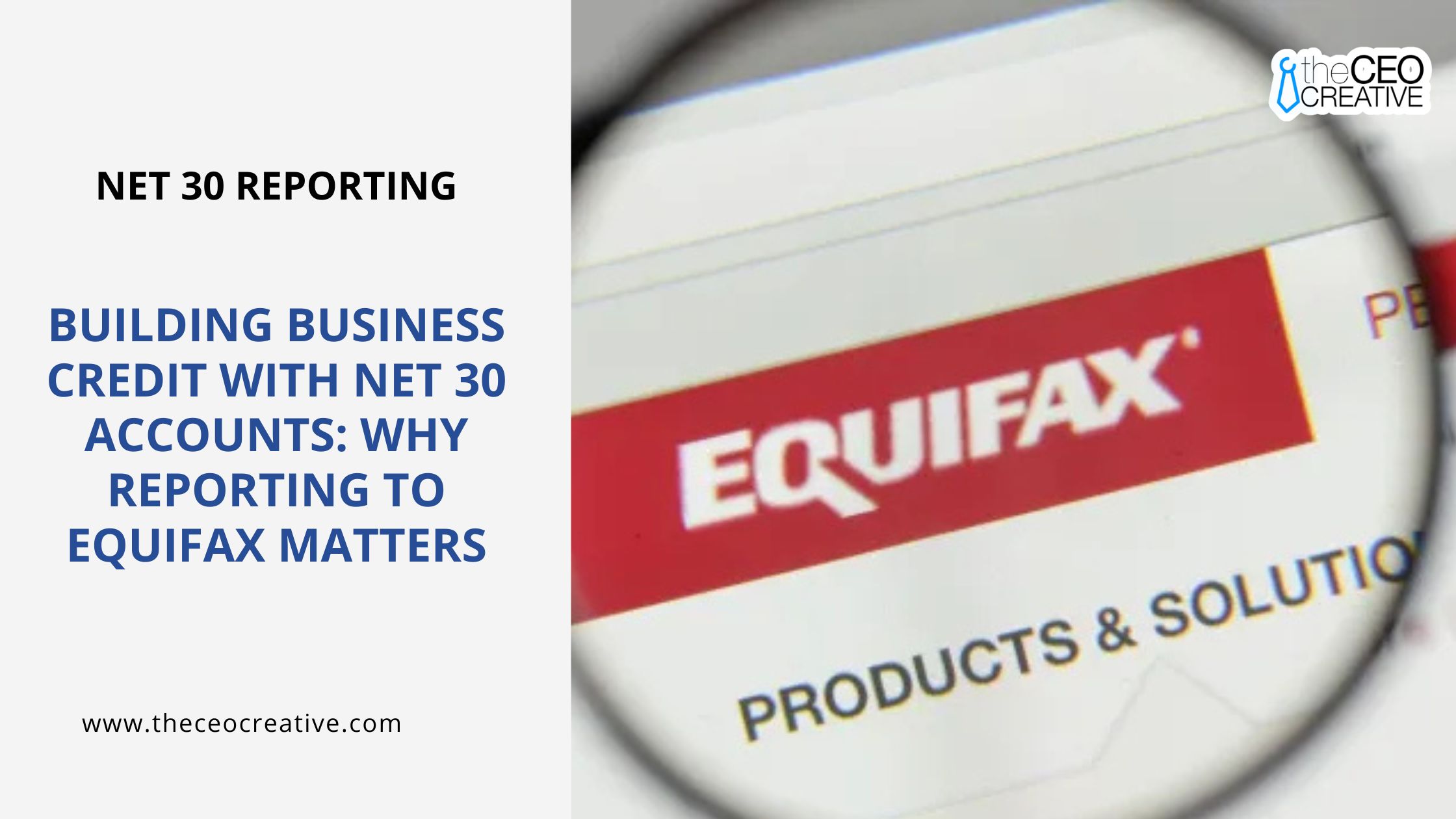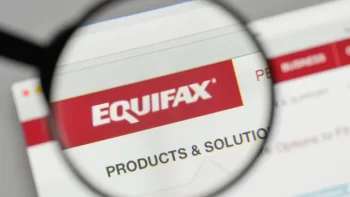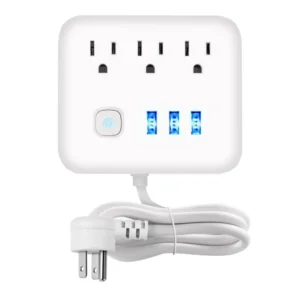Introduction
Establishing business credit can greatly benefit your company, affecting everything from getting loans to negotiating better deals with suppliers. One useful method for building credit is using Net 30 accounts. These accounts let your business make purchases now and pay later, usually within 30 days. But did you know that making sure these accounts are reported to major credit agencies like Equifax is very important? In this blog, we’ll explain why reporting to Equifax is crucial and how it can greatly improve your business credit score.
Understanding Net 30 Accounts
Definition and Benefits
Net 30 accounts are a common way for businesses to buy things from suppliers and pay later. With a Net 30 account, you can buy goods or services and have 30 days to pay the full bill. This kind of credit helps you manage your money better.
Think of it as a time period where you can use your money freely before paying. The main advantages are:
– Better Cash Flow: You have time to sell what you bought before you need to pay.
– Stronger Supplier Relationships: Paying on time builds trust, and suppliers might give you better deals.
– More Financial Freedom: It gives you some extra time to pay without using up all your resources.
How They Affect Business Credit
Net 30 accounts help build your business credit by showing how well you manage your payments. Every time you pay an invoice on time, it proves to lenders that your business is trustworthy and good with money.
So, how does this help build credit? Your history of paying Net 30 accounts can:
– Improve your business credit report.
– Raise your business credit score by showing regular, on-time payments.
– Make it easier to get better loans in the future.
The Added Advantage of Working with Vendors that Report Payment Behavior
Having Net 30 accounts is helpful, but the real boost to your credit comes when your suppliers tell credit agencies about how you pay. Not all suppliers do this, so it’s important to work with those who do.
Here’s why:
– Visibility: This makes sure that your good payment history is seen by banks and other lenders when they check your credit.
– Credit Growth: It helps build your credit profile, showing that you are reliable.
– Better Credit Limits: Suppliers who report to credit agencies can improve your business’s reputation, which might get you higher credit limits and better loan terms.
Basically, working with the right suppliers can speed up your path to a better business credit score.
The Role of Equifax in Business Credit
Overview of Credit Reporting Agencies
Credit reporting agencies are like the managers of your business’s credit information. They gather and handle how your credit history looks to banks and other lenders. The main companies in this area are Experian, Dun & Bradstreet, and Equifax. Each of them has its own way of judging your business’s credit score.
These agencies are very important because:
– They collect details about your business’s credit actions.
– Lenders use these reports to decide whether to lend you money.
– Your business’s financial reputation is greatly affected by the information these agencies give.
Importance of Equifax in Credit Reporting
Equifax is a major player in the credit reporting industry, and there are good reasons for that. When it comes to business credit, Equifax is very important, and understanding its role can greatly help you build better credit.
Here’s why Equifax is special:
– Detailed Reports: Equifax gives thorough reports that show credit history, payment patterns, and business details.
– Special Credit Scores: They provide unique credit scores that help lenders understand the risk of lending to a business.
– Key in Lending Choices: Many lenders and creditors use Equifax’s information to decide if a business is creditworthy and to set the terms for loans.
By making sure your credit-building plan matches Equifax’s standards, your business can get ahead of the competition.
Impact on Business Credit Scores
When it comes to how it affects your business credit score, Equifax’s reports can either help or hinder you, depending on your credit habits. Here’s how good Equifax reporting can benefit your business:
– Good Payment Record: If you regularly pay your Net 30 accounts on time, you can gradually improve your Equifax business credit score, making lenders more likely to trust you.
– Better Financial Options: A higher credit score with Equifax can lead to better financing opportunities, such as loans with lower interest rates and more flexible repayment plans.
– Lower Risk Perception: Businesses with strong Equifax scores are seen as less risky, which can result in better partnership terms.
In the business credit world, using Equifax reporting effectively means setting your company up for growth and stability.
Understanding the details of Net 30 accounts and making sure your payment habits are shared with important organizations like Equifax can help your business grow in a strong and healthy way. With good credit, there are endless opportunities for business expansion, such as getting the best deals from suppliers and having access to large loans when you need them. Remember these tips as you work on building your business credit, and see your business thrive.
Why Reporting to Equifax Matters
Creating a strong business credit score involves more than just paying on time; it also means understanding which credit agencies are monitoring your financial trustworthiness. Equifax is one of the major credit agencies that businesses sometimes ignore, but its reporting standards are very important for business growth and financial stability. Let’s explore why reporting to Equifax is important for your business credit.
Explanation of Equifax’s Unique Credit Metrics
Equifax uses a special group of credit measures that make it different from other credit reporting agencies. Unlike some agencies that mainly look at past financial records, Equifax pays more attention to recent credit actions, your business’s financial strength, and how steady your business is. This means they closely watch how you handle your business debts and if you can meet credit agreements.
– Recent Credit Actions: What you’ve done with credit recently, such as taking out new loans or opening credit lines, is very important in Equifax’s scoring system. This helps lenders see your current credit habits.
– Financial Strength and Stability: Equifax checks your business’s overall financial health, looking at things like cash flow and consistent income. A strong financial base can greatly improve your credit score.
– Debt Handling: How your business deals with its debts matters. Equifax’s measures consider how you manage credit limits and if you regularly pay on time.
Using these metrics helps Equifax provide a complete view of your business’s financial health, which is good for both lenders and borrowers.
How Equifax Differs from Other Bureaus like DNB in Assessing Business Creditworthiness
You may know about Dun & Bradstreet (DNB), another big company that rates businesses, especially with its PAYDEX Score. But Equifax is different because it focuses on predicting future data and using analytics.
– Predicting the Future: Equifax uses special models to guess if a business will pay its debts. This helps them see what might happen financially in the future.
– Many Types of Data: Unlike DNB, which mostly looks at payment history from suppliers, Equifax uses a wider range of data, like public records and financial reports, to judge how creditworthy a business is.
– Full Picture: While DNB mainly looks at how well a business pays, Equifax gives a more complete view by including different financial details and recent credit actions in their analysis.
If you’re exclusively focused on DNB, you might miss the insights and opportunities that Equifax’s broader outlook can provide.
Importance for Securing Loans, Attracting Investors, and Gaining Vendor Trust
Equifax reports can be very important when you’re trying to get loans or bring in investors. Lenders, investors, and even vendors rely on Equifax scores because they give a complete picture of a company’s financial situation. Here’s why this is important:
– Getting Loans: Many banks and financial institutions check Equifax scores when reviewing business loan applications. A good Equifax report can help you get better interest rates or more favorable loan terms.
– Bringing in Investors: Investors want to minimize their risks. A strong Equifax report shows that your business is a safe investment.
– Vendor Confidence: Having a high business credit score with Equifax makes vendors trust you more, which can lead to better payment terms and conditions.
Long-term Benefits for Business Growth
The advantages of Equifax reporting go beyond immediate gains—they lay the groundwork for long-term growth. Here’s how:
– Better Financial Options: A solid credit profile helps your business get approved for higher credit limits and better terms.
– Enhanced Reputation: Keeping a good business credit report with Equifax can boost your business’s standing in the financial world.
– Growth Potential: As your Equifax score improves, you’ll have more chances to expand into new areas or product lines, allowing your business to grow effectively.
How Net 30 Accounts with Equifax Reporting Strengthen Credit
Using Net 30 accounts with Equifax reporting is a smart way to build and improve your business credit score. Knowing how this works can significantly affect your business’s financial path.
Step-by-Step Process of How Timely Payments Build a Positive Equifax Credit Report
Here’s how paying on time for Net 30 accounts helps improve your Equifax credit report:
1. Open Net 30 Accounts: Begin by opening Net 30 accounts with suppliers or vendors who report to Equifax. This means you pay them within 30 days of getting an invoice.
2. Pay on Time: Always make sure to pay within the 30-day period to show that you are reliable.
3. Check Reporting: Sometimes, make sure your payments are being reported correctly to Equifax. This helps ensure your efforts are actually improving your credit score.
4. Track Your Score: Use Equifax’s tools to keep an eye on your credit score over time, so you can see how your payment habits are affecting it.
Each on-time payment for a Net 30 account helps improve your Equifax report, slowly raising your business credit score.
The Role of Equifax in Showcasing Reliable Payment Behavior to Lenders and Partners
Equifax helps you by showing your good payment habits to banks and other lenders. This is important for several reasons:
– Independent Verification: Equifax reports act as an impartial third-party proof of your credit behavior, which can strongly affect how creditors view you.
– Proof of Trustworthiness: These reports offer clear evidence of your consistent and stable payment history, making financial partners feel more confident and helping you during financial discussions.
Examples of How Businesses with Equifax Reporting Access Better Financial Opportunities
Think about practical examples showing how reporting Net 30 accounts to Equifax can lead to better financial chances:
– Better Loan Terms: A construction company with a strong Equifax score got a line of credit with a much lower interest rate, saving money on borrowing.
– Stronger Supplier Relationships: A retail startup got better deals with suppliers, like longer payment times, by regularly reporting payments to Equifax.
– Attracting Investors: A tech company, seen as reliable by its Equifax report, easily got venture capital investment because it showed good financial responsibility.
Adding Net 30 accounts to your credit plan and making sure they are shared with Equifax can greatly change your business’s financial story, helping you prepare for growth and success. Keep in mind, it’s not just about having credit; it’s about using it smartly and seeing the good effects it can have on your business, both now and in the future.
Spotlight on The CEO Creative’s Reporting Advantage
When it comes to building strong business credit, The CEO Creative is a reliable partner. This company provides Net 30 accounts and makes sure that important details about your payment history are reported to major credit agencies like Equifax. This proactive strategy can significantly improve your business credit standing.
Introduction to The CEO Creative’s Net 30 Services
The CEO Creative provides several services that can help businesses build and enhance their credit reputation. Their Net 30 accounts are made to assist businesses in managing their cash flow while building a strong credit history. By giving businesses 30 days to pay their bills after a purchase, they can better manage their money.
What’s even more helpful is that The CEO Creative reports your account activity to Equifax. This means that your efforts to pay on time are recorded and shown in your credit report, which helps improve your business credit score. This detailed reporting can give your business a strong base for future financial activities.
Key Benefits of Working with The CEO Creative
Let’s look at some great advantages of choosing The CEO Creative for your Net 30 account needs:
– Focus on Building Credit: The CEO Creative helps you improve your business credit. They make sure your payments are reported, so credit agencies like Equifax recognize your business.
– Better Cash Flow Control: With Net 30 terms, you can manage payments without needing money right away, which helps keep your cash flow steady.
– Stronger Supplier Relationships: By paying your Net 30 bills on time, you build trust with suppliers. This can lead to better deals or exclusive offers.
– Easy Transaction Handling: The CEO Creative aims to make things simple for businesses. They ensure that setting up and managing your Net 30 accounts is easy and beneficial.
With these advantages in mind, it’s clear why companies seeking to build their business credit see The CEO Creative as a valuable ally.
Practical Tips for Businesses Using Net 30 Accounts
Now that we’ve looked at the good things about Net 30 accounts and the special benefits from The CEO Creative, let’s talk about some useful advice to help you handle your accounts well and improve your credit.
Strategies to Ensure Timely Payments and Avoid Late Penalties
A key part of managing a Net 30 account is making sure you pay on time. Here are some tips to help you avoid missing payments:
– Use Reminders: Set up reminders on your calendar or with financial software to remind you to pay ahead of time.
– Automate Payments: When you can, set up automatic payments. This helps you remember due dates and keeps your payments regular.
– Pay Early: If you can, try to pay a few days before the due date. This can improve your relationship with suppliers and show that you manage money well.
By using these tips, you can avoid late fees and improve your business’s credit standing.
Monitoring Equifax Reports to Track Progress
After you’ve set up your Net 30 accounts and started building your credit, it’s important to keep an eye on your Equifax reports. Here’s how you can stay on top of your credit progress:
– Regular Reviews: Plan to check your Equifax credit report regularly, maybe every three months. Look for any changes in your credit score, new accounts, or mistakes that need fixing.
– Watch for Patterns: Over time, notice any patterns in your credit score. If you see a sudden drop, look into it right away to find any negative items that need to be corrected.
– Fix Mistakes: If there are any errors on your report, get them fixed quickly. Contact Equifax to dispute any inaccuracies, as they can affect your credit score.
Monitoring your credit reports diligently ensures that your efforts in credit building are accurately reflected and that your business maintains a trajectory toward improved credit health.
Diversifying Credit-Building Efforts with Multiple Vendors and Credit Bureaus
Building business credit isn’t a one-size-fits-all process, and having a varied approach can be very helpful. Here’s what you need to know:
– Work with Different Suppliers: Besides The CEO Creative, try to set up Net 30 accounts with other suppliers too. Each relationship can help your credit profile in different ways.
– Report to Multiple Credit Agencies: Make sure all your suppliers report to multiple credit agencies, not just Equifax. This helps spread out your credit-building efforts and gives a complete picture to lenders or business partners.
– Use Different Types of Credit: Combine Net 30 accounts with other types of credit, like business credit cards or lines of credit, to show that you can handle various kinds of borrowing.
By spreading out your efforts to build credit, you create a stronger and more balanced business credit profile. In the long run, this broad approach helps your business succeed financially, making it easier to get loans or negotiate better deals with new suppliers.
Starting to build your business credit might seem tough at first, but with organized practices, careful monitoring, and helpful partners like The CEO Creative, the process becomes much easier. As your credit profile improves, you’ll also gain more chances to grow and expand your business in the market.
Conclusion
To sum up, using Net 30 accounts to develop business credit is a smart approach for any growing business. By making sure these accounts are reported to credit agencies like Equifax, you give your business the best opportunity to create a strong credit history. Keep in mind that a strong business credit score can lead to better loan options, more favorable conditions, and greater trust from potential partners and suppliers. Take control of your business’s financial future by building your credit carefully and effectively.











